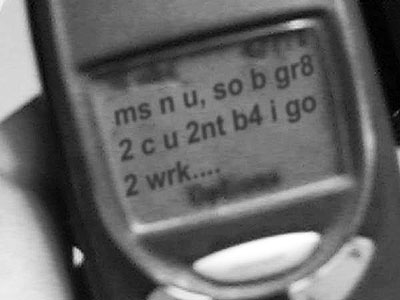Someone is nagging you for months on end, for a small loan because they have “something small” to fix. On this particular day, if only to free yourself from this ever-present burden, you decide to fork out a few tens of thousands of francs to said person, put it on their Mobile Money even, and duly text them about the same.


Someone is nagging you for months on end, for a small loan because they have "something small” to fix. On this particular day, if only to free yourself from this ever-present burden, you decide to fork out a few tens of thousands of francs to said person, put it on their Mobile Money even, and duly text them about the same.You don’t, of course, want them to make a huge fuss about it; just go claim their money and move on with life. But neither do you want the sort of SMS response that simply says; "k” for "okay”, or "thx” for thanks. How do I put all my problems aside, part with hard earned money to give you a quick fix, send you a text to confirm your good fortune, yet at the end of it, all you can do is type your appreciation as simply "k”? I repeat: I hate SMS language with all my heart. Those things of "u”, "ur” are so annoying, I find them a little sub-cultured. Grammar challenged people should try to improve their language. It’s a shame, but with our modern culture, grammar and expression (in written form) has taken an about-turn back into the primitive ages. And it all started with the introduction of the internet back in the late eighties/early 90s. When "chat language” and "smileys” became the new order of sending messages, it soon became a cultural norm for internet users, especially pre-teens, teenagers and students to make use of that even in non-chat communications. And now, with text messaging for cell phones ("SMS”), it’s only gotten worse. At most, it is within limits to use smileys and simple chat acronyms in posts and conversation ("lol”, "rofl”, lmao”, ...but who still goes for things like "l8terz”, "w/e”, etc? Coming from the last generation of teenagers who did not have the internet to play with, I should know better. In our day, we used Sony Walkmans (and other cheap imitations of that brand), rather than iPods (which obviously didn’t exist). In my day, we still read books, and so I was always ready to sit through a longer reading session without getting frustrated. In our less insane days, things like sentence construction and grammar (and spelling) actually meant something. They meant a lot. And those who screwed those things up only did so because they were poor at grammar, spelling and sentence construction, not because they were purposefully trying to misspell, or be grammatically shabby. It’s a shame that while today’s teens have more access to better technology than their counterparts of 15-20 years ago, those teenagers of the past generally still communicated better. Not just better –way better. How sad for the current state of affairs!


